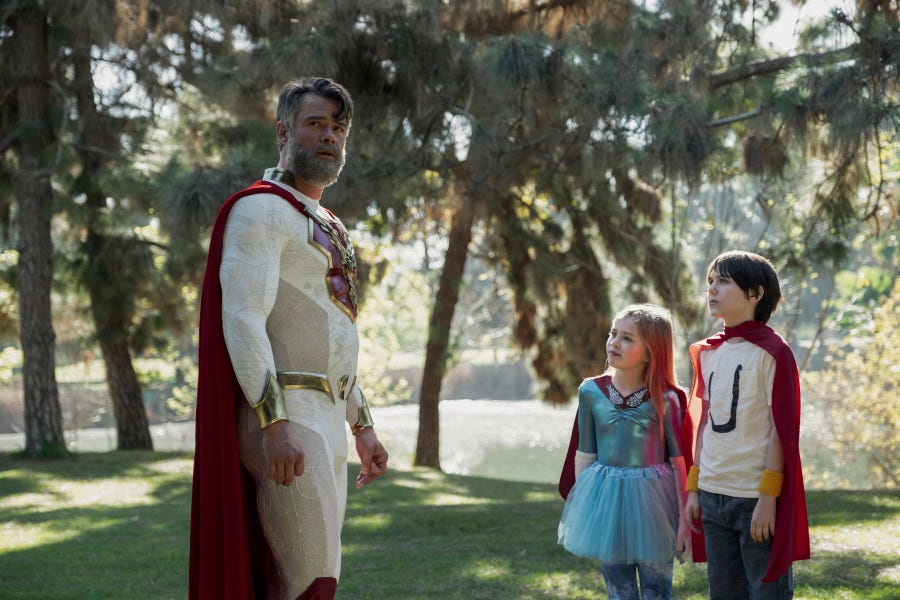With the many, many, many, many superhero movies and shows coming out of the Marvel factory over the course of the past decade, it was inevitable that there would be a pushback to the quickly established studio-enforced sameness of superhero movies. The last few years have spawned works like The Boys, Watchmen, and The Umbrella Academy. Now comes Jupiter’s Legacy, the newest entry in the superhero deconstruction genre that may also be its best—a show that combines escapism with serious contemplation about moral relativism.
The Netflix show follows the aging world’s greatest superhero Sheldon Sampson, better known as the Utopian (Josh Duhamel), as he leads a superhero team consisting of his wife Grace Sampson/Lady Liberty (Leslie Bibb); his brother Walter Sampson/Brainwave (Ben Daniels); his son Brandon Sampson/Paragon (Andrew Horton); and a few others. Also in their orbit is Sheldon and Grace’s daughter Chloe Sampson (Elena Kampouris), who has renounced her family’s occupation by becoming a drug-using socialite who uses her powers and name to score modeling gigs and dates rather than fight crime.
There are two interwoven stories at play in Jupiter’s Legacy: The first follows the protagonists in modern day, focusing on the lives of Brandon and Chloe as they struggle with the weight of expectations and their parents’ fame. The second explores how Utopian, Lady Liberty, and others from the first generation of heroes received their powers 90 years earlier—they all age incredibly slowly, allowing them to still kick butt in modern day despite all being born in the early 1900s. It’s a bit like the Fantastic Four by way of H.P. Lovecraft and 1930s pulp fiction: Following the stock market crash in 1929 and the death by suicide of wealthy father, Sampson starts experiencing eldritch visions that call him to a mysterious island. With a well-coiffed band of friends turned adventurers, Sampson sets out for the island and the group is endowed with superpowers by some higher being.
Both are interesting storylines, but it’s the latter that truly shines. It’s good old fashioned escapism with mystery and adventure, and the cast lends itself well to the 30s throwback vibes. Duhamel is well-suited to the swashbuckling leading-man role, bringing the right amount of angst, confusion, madness, and heroism to the part. As I said, the present day storyline is quite interesting as well, but I felt myself longing for a full miniseries or movie about the group’s trip to and exploration of the island.
But while the 1930s-era plotline is the more beautiful and fun of the two, it’s the events of the present that feature the true ideas the show is interested in dissecting. Capitalist, Christian, all-American, Sampson is a clear Superman stand-in—and perhaps a better Superman than our current Superman—who finds his virtuous ideals, enshrined with his beloved Code, at odds with modernity. The Code consists of rules for heroes, including prohibitions against using their powers to rule humanity and using their powers to kill. Believing times have changed, the new generation of heroes, as well as several of the old guard, now view such rules as insufficient in their quest for peace. What good is doing the right thing if the rest of the world doesn’t as well?
The latter is a question that Brandon/Paragon poses to his mother at one point as he finds himself struggling over the central point of tension among heroes in the show: With new villains that are more violent and prone to killing than the bank robbers of the Utopian’s early days, should heroes use the same tactics against them? (A salient question for politics today as ideologues of all stripes use the escalating bad behavior of their opponents to justify their own escalation.)
The Utopian stands on one side, with the younger heroes and 78 percent of the public supporting a more aggressive stance. It seems easier and safer, they argue, to use lethal force to ensure heroes don’t lose their own lives in the process of trying to stop the bad guys. Cut down the villain early on and you limit potential loss of life. The show doesn’t shy away from presenting the complexity of the matter. There is a natural sympathy for those who break the code: They are, after all, trying to not die and to make sure their fellow heroes don’t get killed. Even the heroes who accept the Code struggle with it, wanting to protect their family and friends and themselves.
But the Utopian argues, in Socratic fashion, that it is better to suffer harm than perform it, that even though modern villains are more murderous than in the past, such does not change the immutable truth that all life has value and that heroes’ behavior ought to reflect that through striving for the highest good—protecting the lives of even the villains they try to stop—even at personal cost.
This logic may not convince every viewer—it certainly doesn’t convince many of the other heroes—but as natural as it is to ask “What good is doing the right thing if the rest of the world doesn’t?” when faced by an immoral foe, a more important one to ask, Jupiter’s Legacy seems to suggest, is “What good is the right thing if nobody does it at all?”








Please note that we at The Dispatch hold ourselves, our work, and our commenters to a higher standard than other places on the internet. We welcome comments that foster genuine debate or discussion—including comments critical of us or our work—but responses that include ad hominem attacks on fellow Dispatch members or are intended to stoke fear and anger may be moderated.
You are currently using a limited time guest pass and do not have access to commenting. Consider subscribing to join the conversation.
With your membership, you only have the ability to comment on The Morning Dispatch articles. Consider upgrading to join the conversation everywhere.